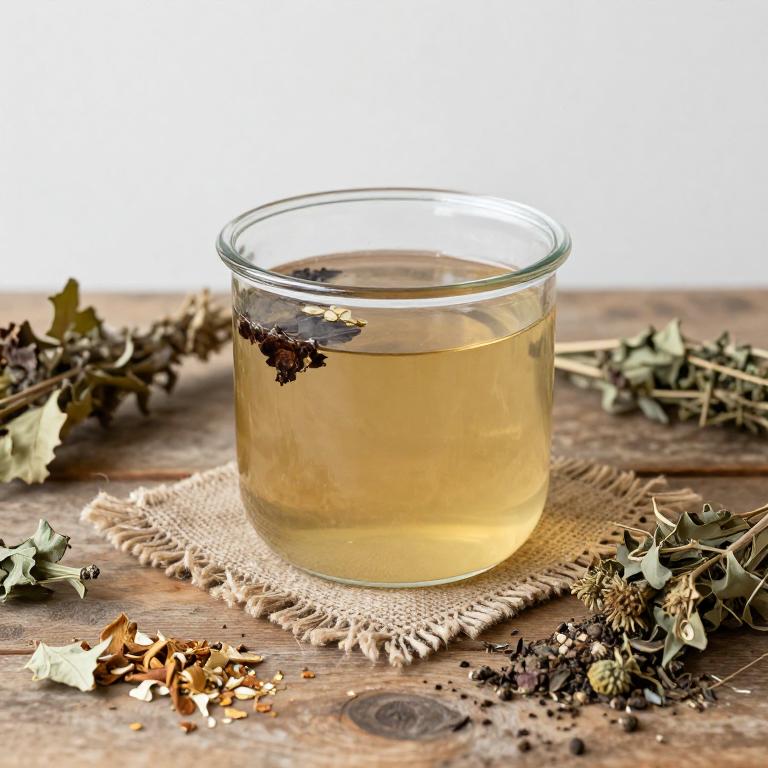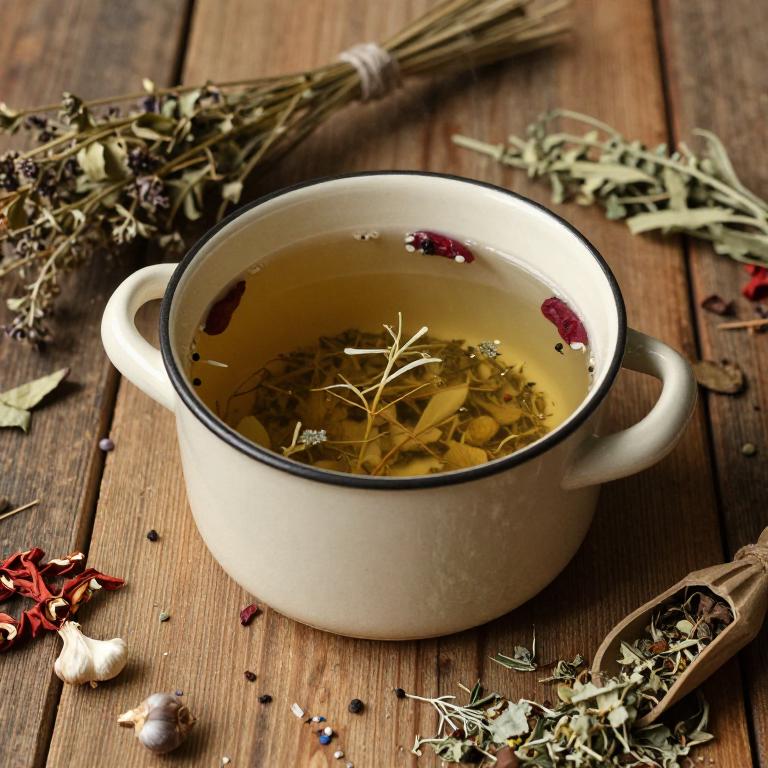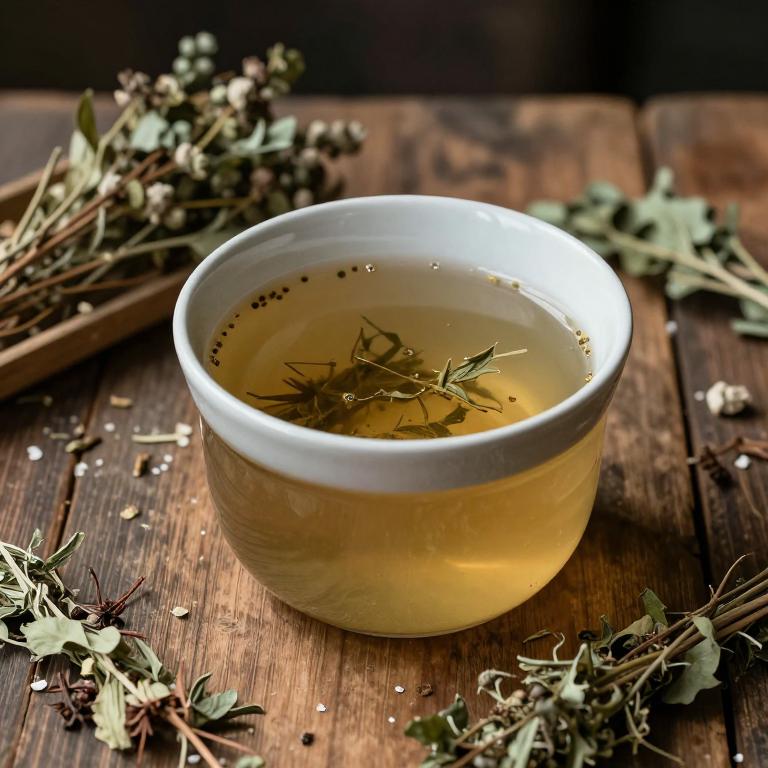10 Best Herbal Decoctions For Gastritis

Herbal decoctions have been traditionally used to support the treatment of gastritis by soothing the stomach lining and reducing inflammation.
Commonly used herbs include licorice root, ginger, chamomile, and peppermint, each known for their anti-inflammatory and digestive properties. These decoctions are typically prepared by simmering the herbs in water for an extended period to extract their active compounds. They are often recommended as a complementary therapy alongside conventional treatments to alleviate symptoms like heartburn and indigestion.
However, it is important to consult a healthcare professional before using herbal decoctions, as they may interact with medications or have side effects in certain individuals.
Table of Contents
- 1. Turmeric (Curcuma longa)
- 2. Licorice (Glycyrrhiza glabra)
- 3. Ginger (Zingiber officinale)
- 4. Thistle (Silybum marianum)
- 5. Cumin (Cuminum cyminum)
- 6. Chamomile (Matricaria chamomilla)
- 7. Dog rose (Rosa canina)
- 8. Stinging nettle (Urtica dioica)
- 9. Camellia (Camellia sinensis)
- 10. Peppermint (Mentha piperita)
1. Turmeric (Curcuma longa)

Curcuma longa, commonly known as turmeric, contains curcumin, a bioactive compound with potent anti-inflammatory and antioxidant properties.
Herbal decoctions made from Curcuma longa are often used in traditional medicine to alleviate symptoms of gastritis, which is characterized by inflammation of the stomach lining. These decoctions may help reduce stomach acid secretion and protect the gastric mucosa from damage. However, while some studies suggest potential benefits, more clinical research is needed to confirm their efficacy and safety in treating gastritis.
It is advisable to consult a healthcare professional before using turmeric-based remedies as part of a treatment plan for gastritis.
2. Licorice (Glycyrrhiza glabra)

Glycyrrhiza glabra, commonly known as licorice root, has been traditionally used in herbal medicine for its anti-inflammatory and soothing properties.
When prepared as a decoction, licorice root can help alleviate symptoms of gastritis by reducing inflammation in the stomach lining and protecting it from irritants. The active compounds in licorice, such as glycyrrhizin and flavonoids, contribute to its ability to neutralize stomach acid and promote healing. However, long-term use of licorice decoctions may lead to side effects like increased blood pressure due to its mineralocorticoid-like effects.
Therefore, it is often recommended to use licorice root under the guidance of a healthcare professional, especially for individuals with pre-existing health conditions.
3. Ginger (Zingiber officinale)

Zingiber officinale, commonly known as ginger, has been widely used in herbal medicine for its anti-inflammatory and digestive properties.
Herbal decoctions made from fresh or dried ginger root are often prepared by simmering the rhizome in water to extract its active compounds, such as gingerol and shogaol. These decoctions are traditionally used to alleviate symptoms of gastritis, including nausea, bloating, and stomach pain, due to their ability to reduce gastric inflammation and improve digestion. The warming effects of ginger decoctions can also help soothe the stomach lining and promote the secretion of digestive enzymes.
However, individuals with severe gastritis should consult a healthcare professional before using ginger as a treatment, as it may interact with certain medications or exacerbate symptoms in some cases.
4. Thistle (Silybum marianum)

Silybum marianum, also known as milk thistle, is a herbal remedy commonly used in the preparation of decoctions for the treatment of gastritis.
The active compound, silymarin, is believed to possess anti-inflammatory and antioxidant properties that may help protect the stomach lining from irritation and damage. When prepared as a decoction, the plant's seeds are typically boiled in water to extract its beneficial compounds, which are then consumed as a tea or supplement. This traditional herbal approach is often used alongside conventional medical treatments to support digestive health.
While some studies suggest potential benefits, more research is needed to fully establish its efficacy and safety for gastritis management.
5. Cumin (Cuminum cyminum)

Cuminum cyminum, commonly known as cumin, has been traditionally used in herbal medicine for its potential benefits in treating gastritis.
The essential oils and volatile compounds in cumin seeds, such as limonene and cumin aldehyde, are believed to possess anti-inflammatory and antispasmodic properties that may help soothe the stomach lining. A herbal decoction made from cumin seeds can be prepared by boiling the seeds in water and consuming the liquid, which may aid in reducing digestive discomfort and promoting healthy digestion. This natural remedy is often used in conjunction with other herbal treatments to manage symptoms of gastritis, such as bloating and heartburn.
However, it is important to consult a healthcare professional before using cumin decoctions, especially for individuals with existing medical conditions or those taking medications.
6. Chamomile (Matricaria chamomilla)

Matricaria chamomilla, commonly known as German chamomile, is widely used in herbal decoctions for the treatment of gastritis due to its anti-inflammatory and antispasmodic properties.
When prepared as a tea, chamomile soothes the lining of the stomach and reduces irritation caused by excess acid or inflammation. The active compounds, such as bisabolol and flavonoids, help to calm digestive discomfort and promote healing of the gastrointestinal tract. Regular consumption of chamomile decoctions may alleviate symptoms like heartburn, bloating, and nausea associated with gastritis.
However, it is important to consult with a healthcare provider before using chamomile, especially for individuals with allergies or those taking medications that may interact with herbal remedies.
7. Dog rose (Rosa canina)

Rosa canina, commonly known as rose hip, has been traditionally used in herbal medicine for its anti-inflammatory and antioxidant properties.
Herbal decoctions made from the dried fruits of Rosa canina are often employed to support digestive health, particularly in managing conditions like gastritis. These decoctions may help reduce inflammation in the stomach lining and promote the healing of gastrointestinal tissues. The high content of bioflavonoids and vitamin C in rose hips contributes to their soothing effects on the digestive system.
However, it is important to consult with a healthcare professional before using rosa canina decoctions, especially for individuals with existing medical conditions or those taking other medications.
8. Stinging nettle (Urtica dioica)

Urtica dioica, commonly known as stinging nettle, has been traditionally used in herbal medicine for its anti-inflammatory and soothing properties.
When prepared as a decoction, it can help alleviate symptoms of gastritis by reducing stomach inflammation and promoting the healing of the gastric lining. The decoction is typically made by boiling the fresh or dried leaves in water for an extended period to extract its beneficial compounds. It is often recommended to consume this herbal remedy in small, frequent doses to minimize potential irritation to the stomach.
However, individuals with gastritis should consult a healthcare professional before using urtica dioica, as it may interact with certain medications or conditions.
9. Camellia (Camellia sinensis)

Camellia sinensis, commonly known as the tea plant, is the source of various herbal decoctions that have been traditionally used to support digestive health.
These decoctions, often made from the leaves of the plant, contain bioactive compounds such as polyphenols, catechins, and caffeine, which may help reduce inflammation in the stomach lining. Some studies suggest that certain preparations of Camellia sinensis can alleviate symptoms of gastritis by inhibiting the production of stomach acid and promoting the healing of gastric ulcers. However, due to its caffeine content, it is important to use these decoctions with caution, especially in individuals with sensitive stomachs or those taking other medications.
Overall, while Camellia sinensis herbal decoctions show potential as a complementary therapy for gastritis, they should be used under the guidance of a healthcare professional.
10. Peppermint (Mentha piperita)

Mentha piperita, commonly known as peppermint, is often used in herbal decoctions to alleviate symptoms of gastritis due to its soothing and carminative properties.
The essential oils in peppermint, particularly menthol, help relax the smooth muscles of the gastrointestinal tract, reducing spasms and discomfort. When prepared as a decoction, peppermint can ease inflammation and promote digestion, making it a popular remedy in traditional and complementary medicine. However, it should be used cautiously in individuals with severe gastritis, as it may increase stomach acid in some cases.
It is best to consult a healthcare provider before using peppermint decoctions to ensure safety and effectiveness for individual health conditions.